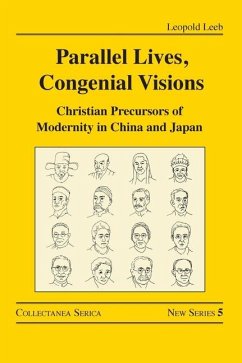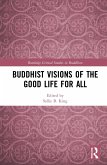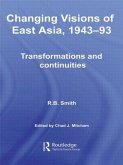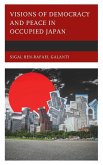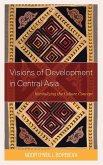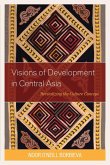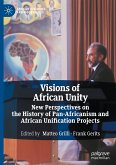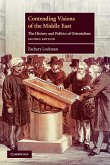- Gebundenes Buch
- Merkliste
- Auf die Merkliste
- Bewerten Bewerten
- Teilen
- Produkt teilen
- Produkterinnerung
- Produkterinnerung
This book introduces the history of cultural exchanges between East Asia and the West through comparative biographical sketches of sixty personalities from China and Japan.
Andere Kunden interessierten sich auch für
![Buddhist Visions of the Good Life for All Buddhist Visions of the Good Life for All]() Buddhist Visions of the Good Life for All180,99 €
Buddhist Visions of the Good Life for All180,99 €![Changing Visions of East Asia, 1943-93 Changing Visions of East Asia, 1943-93]() R. B. SmithChanging Visions of East Asia, 1943-9358,99 €
R. B. SmithChanging Visions of East Asia, 1943-9358,99 €![Visions of Democracy and Peace in Occupied Japan Visions of Democracy and Peace in Occupied Japan]() Sigal Ben-Rafael GalantiVisions of Democracy and Peace in Occupied Japan127,99 €
Sigal Ben-Rafael GalantiVisions of Democracy and Peace in Occupied Japan127,99 €![Visions of Development in Central Asia Visions of Development in Central Asia]() Noor O'Neill BorbievaVisions of Development in Central Asia121,99 €
Noor O'Neill BorbievaVisions of Development in Central Asia121,99 €![Visions of Development in Central Asia Visions of Development in Central Asia]() Noor O'Neill BorbievaVisions of Development in Central Asia49,99 €
Noor O'Neill BorbievaVisions of Development in Central Asia49,99 €![Visions of African Unity Visions of African Unity]() Visions of African Unity112,99 €
Visions of African Unity112,99 €![Contending Visions of the Middle East Contending Visions of the Middle East]() Zachary LockmanContending Visions of the Middle East34,99 €
Zachary LockmanContending Visions of the Middle East34,99 €-
-
-
This book introduces the history of cultural exchanges between East Asia and the West through comparative biographical sketches of sixty personalities from China and Japan.
Hinweis: Dieser Artikel kann nur an eine deutsche Lieferadresse ausgeliefert werden.
Hinweis: Dieser Artikel kann nur an eine deutsche Lieferadresse ausgeliefert werden.
Produktdetails
- Produktdetails
- Verlag: Routledge
- Seitenzahl: 296
- Erscheinungstermin: 29. März 2024
- Englisch
- Abmessung: 260mm x 183mm x 21mm
- Gewicht: 756g
- ISBN-13: 9781032621982
- ISBN-10: 1032621982
- Artikelnr.: 69483676
- Herstellerkennzeichnung
- Libri GmbH
- Europaallee 1
- 36244 Bad Hersfeld
- gpsr@libri.de
- Verlag: Routledge
- Seitenzahl: 296
- Erscheinungstermin: 29. März 2024
- Englisch
- Abmessung: 260mm x 183mm x 21mm
- Gewicht: 756g
- ISBN-13: 9781032621982
- ISBN-10: 1032621982
- Artikelnr.: 69483676
- Herstellerkennzeichnung
- Libri GmbH
- Europaallee 1
- 36244 Bad Hersfeld
- gpsr@libri.de
Leopold Leeb studied philosophy and theology in Mödling (near Vienna) and Chinese philosophy at Fu Jen Catholic University, Taipei, and at Beijing University. He received his Ph.D. from the latter with a dissertation on the Han dynasty mathematician, astronomer and writer Zhang Heng. From 1999 till 2004 he worked as a researcher and translator at the Chinese Academy of Social Sciences. Since 2004 he is professor at Renmin University, Beijing, where he teaches Latin, Ancient Greek, Ancient Hebrew, and the history of Western literature. His research also focuses on the history of Christianity in China. He has published widely in China, among others an introduction to the language and thought of the Bible, language courses in Latin, Latin dictionaries, a dictionary on Chinese theology and the series "English-Chinese Summaries of Western Classics," of which volume 5 has been published 2020. Recently, he published the monograph One Dragon, Two Doves: A Comparative History of the Catholic Church in China and in Vietnam (2022).
Preface by He Guanghu Preface by Muraoka Takamitsu Preface by the Author Introduction Chapter One: The Trailblazers' Guides: Anjir
(ca. 1520-1565) and Zhong Mingren (1562-1621) Chapter Two: The First Translators of European Texts: Yohoken (ca. 1510-1596) and Xu Ruohan (ca. 1670-1740) 9 Chapter Three: Noble Promoters of Military Reforms:
tomo S
rin (1530-1587) and Xu Guangqi (1562-1633) Chapter Four: "Grace" and "Brilliance": Hosokawa Garasha (1563-1600) and Candida Xu (1607-1680) Chapter Five: Pioneers of Comparative Philosophy: Fukansai (1565-1621) and Yang Tingyun (ca. 1557-1628) Chapter Six: The First Native Priests: Kimura (1565-1622) and Luo Wenzao (1617-1691) Chapter Seven: The First Travelers to Europe: It
Mancio (1569-1612) and Zheng Manuo (1633-1673) Chapter Eight: Precursors of the Internationalization of the Script: Dourado (1567-1620) and Wang Zheng (1571-1644) Chapter Nine: The First Editors of Bilingual Dictionaries: Martin Hara (1568-1629) and Huang Risheng (1679-1716) Chapter Ten: The Earliest Celebrities in Europe: Hasekura Tsunenaga (1571-1622) and Shen Fuzong (ca. 1658-1692) Chapter Eleven: Western Art in the East: Jacobus Niva (Ni Yagu, 1579-1638) and You Wenhui (1575-1633) Chapter Twelve: Hope of the Suppressed: Amakusa Shir
(1622-1638) and Wang Maria (ca. 1855-1900) Chapter Thirteen: Interrogation of a Messenger from the West: Arai Hakuseki (1657-1725) and Kangxi (r. 1662-1722) Chapter Fourteen: Early Students of Western Medicine: Gao Leisi (1732-1795), Yang Dewang (1733-1798), and Sugita Genpaku (1733-1817) Chapter Fifteen: The First Teachers of Western Languages: Ogata K
an (1810-1863) and Xue Madou (ca. 1780-1860) Chapter Sixteen: Organizers of Modern Media: Fukuzawa Yukichi (1835-1901) and Ying Lianzhi (1866-1926) Chapter Seventeen: Creators of Universities: Yan Yongjing (1838-1898) and Niijima J
(1843-1890) Chapter Eighteen: Entrepreneurs and Philanthropists: Shibusawa Eiichi (1840-1931) and Lu Bohong (1875-1937) Chapter Nineteen: The First Female Physicians: Ogino Ginko (1851-1913) and Jin Yamei (1864-1934) 135 Chapter Twenty: Pioneers of Women's Education: Tsuda Umeko (1864-1929) and Zeng Baosun (1893-1978) Chapter Twenty-One: Faith on the Way to Inculturation: Uemura Masahisa (1858-1925) and Zhao Zichen (T.C. Chao, 1888-1979) Chapter Twenty-Two: Fathers of Constitutional Law: Ume Kenjir
(1860-1910) and Wu Jingxiong (1899-1986) Chapter Twenty-Three: Creators of an Image of the East: Nitobe Inaz
(1862-1933) and Gu Hongming (1857-1928) Chapter Twenty-Four: Independent Prophets: Uchimura Kanz
(1861-1930) and Wang Mingdao (1900-1991) Chapter Twenty-Five: Pioneers in the Study of History: Saeki Yoshir
(1871-1965) and Chen Yuan (1880-1971) Chapter Twenty-Six: The First Students of Classical Hebrew: Kotsuji Setsuz
(1887-1965) and Li Rongfang (1899-1973) Chapter Twenty-Seven: Indigenization of Christian Art: Chen Yuandu (1903-1967) and Watanabe Sadao (1913-1996) Chapter Twenty-Eight: A Life for the Poor: Wu Yongbo (1916-2002) and Kitahara Satoko (1929-1958) Conclusion: Two Nations on the Way to Modernity
(ca. 1520-1565) and Zhong Mingren (1562-1621) Chapter Two: The First Translators of European Texts: Yohoken (ca. 1510-1596) and Xu Ruohan (ca. 1670-1740) 9 Chapter Three: Noble Promoters of Military Reforms:
tomo S
rin (1530-1587) and Xu Guangqi (1562-1633) Chapter Four: "Grace" and "Brilliance": Hosokawa Garasha (1563-1600) and Candida Xu (1607-1680) Chapter Five: Pioneers of Comparative Philosophy: Fukansai (1565-1621) and Yang Tingyun (ca. 1557-1628) Chapter Six: The First Native Priests: Kimura (1565-1622) and Luo Wenzao (1617-1691) Chapter Seven: The First Travelers to Europe: It
Mancio (1569-1612) and Zheng Manuo (1633-1673) Chapter Eight: Precursors of the Internationalization of the Script: Dourado (1567-1620) and Wang Zheng (1571-1644) Chapter Nine: The First Editors of Bilingual Dictionaries: Martin Hara (1568-1629) and Huang Risheng (1679-1716) Chapter Ten: The Earliest Celebrities in Europe: Hasekura Tsunenaga (1571-1622) and Shen Fuzong (ca. 1658-1692) Chapter Eleven: Western Art in the East: Jacobus Niva (Ni Yagu, 1579-1638) and You Wenhui (1575-1633) Chapter Twelve: Hope of the Suppressed: Amakusa Shir
(1622-1638) and Wang Maria (ca. 1855-1900) Chapter Thirteen: Interrogation of a Messenger from the West: Arai Hakuseki (1657-1725) and Kangxi (r. 1662-1722) Chapter Fourteen: Early Students of Western Medicine: Gao Leisi (1732-1795), Yang Dewang (1733-1798), and Sugita Genpaku (1733-1817) Chapter Fifteen: The First Teachers of Western Languages: Ogata K
an (1810-1863) and Xue Madou (ca. 1780-1860) Chapter Sixteen: Organizers of Modern Media: Fukuzawa Yukichi (1835-1901) and Ying Lianzhi (1866-1926) Chapter Seventeen: Creators of Universities: Yan Yongjing (1838-1898) and Niijima J
(1843-1890) Chapter Eighteen: Entrepreneurs and Philanthropists: Shibusawa Eiichi (1840-1931) and Lu Bohong (1875-1937) Chapter Nineteen: The First Female Physicians: Ogino Ginko (1851-1913) and Jin Yamei (1864-1934) 135 Chapter Twenty: Pioneers of Women's Education: Tsuda Umeko (1864-1929) and Zeng Baosun (1893-1978) Chapter Twenty-One: Faith on the Way to Inculturation: Uemura Masahisa (1858-1925) and Zhao Zichen (T.C. Chao, 1888-1979) Chapter Twenty-Two: Fathers of Constitutional Law: Ume Kenjir
(1860-1910) and Wu Jingxiong (1899-1986) Chapter Twenty-Three: Creators of an Image of the East: Nitobe Inaz
(1862-1933) and Gu Hongming (1857-1928) Chapter Twenty-Four: Independent Prophets: Uchimura Kanz
(1861-1930) and Wang Mingdao (1900-1991) Chapter Twenty-Five: Pioneers in the Study of History: Saeki Yoshir
(1871-1965) and Chen Yuan (1880-1971) Chapter Twenty-Six: The First Students of Classical Hebrew: Kotsuji Setsuz
(1887-1965) and Li Rongfang (1899-1973) Chapter Twenty-Seven: Indigenization of Christian Art: Chen Yuandu (1903-1967) and Watanabe Sadao (1913-1996) Chapter Twenty-Eight: A Life for the Poor: Wu Yongbo (1916-2002) and Kitahara Satoko (1929-1958) Conclusion: Two Nations on the Way to Modernity
Preface by He Guanghu Preface by Muraoka Takamitsu Preface by the Author Introduction Chapter One: The Trailblazers' Guides: Anjir
(ca. 1520-1565) and Zhong Mingren (1562-1621) Chapter Two: The First Translators of European Texts: Yohoken (ca. 1510-1596) and Xu Ruohan (ca. 1670-1740) 9 Chapter Three: Noble Promoters of Military Reforms:
tomo S
rin (1530-1587) and Xu Guangqi (1562-1633) Chapter Four: "Grace" and "Brilliance": Hosokawa Garasha (1563-1600) and Candida Xu (1607-1680) Chapter Five: Pioneers of Comparative Philosophy: Fukansai (1565-1621) and Yang Tingyun (ca. 1557-1628) Chapter Six: The First Native Priests: Kimura (1565-1622) and Luo Wenzao (1617-1691) Chapter Seven: The First Travelers to Europe: It
Mancio (1569-1612) and Zheng Manuo (1633-1673) Chapter Eight: Precursors of the Internationalization of the Script: Dourado (1567-1620) and Wang Zheng (1571-1644) Chapter Nine: The First Editors of Bilingual Dictionaries: Martin Hara (1568-1629) and Huang Risheng (1679-1716) Chapter Ten: The Earliest Celebrities in Europe: Hasekura Tsunenaga (1571-1622) and Shen Fuzong (ca. 1658-1692) Chapter Eleven: Western Art in the East: Jacobus Niva (Ni Yagu, 1579-1638) and You Wenhui (1575-1633) Chapter Twelve: Hope of the Suppressed: Amakusa Shir
(1622-1638) and Wang Maria (ca. 1855-1900) Chapter Thirteen: Interrogation of a Messenger from the West: Arai Hakuseki (1657-1725) and Kangxi (r. 1662-1722) Chapter Fourteen: Early Students of Western Medicine: Gao Leisi (1732-1795), Yang Dewang (1733-1798), and Sugita Genpaku (1733-1817) Chapter Fifteen: The First Teachers of Western Languages: Ogata K
an (1810-1863) and Xue Madou (ca. 1780-1860) Chapter Sixteen: Organizers of Modern Media: Fukuzawa Yukichi (1835-1901) and Ying Lianzhi (1866-1926) Chapter Seventeen: Creators of Universities: Yan Yongjing (1838-1898) and Niijima J
(1843-1890) Chapter Eighteen: Entrepreneurs and Philanthropists: Shibusawa Eiichi (1840-1931) and Lu Bohong (1875-1937) Chapter Nineteen: The First Female Physicians: Ogino Ginko (1851-1913) and Jin Yamei (1864-1934) 135 Chapter Twenty: Pioneers of Women's Education: Tsuda Umeko (1864-1929) and Zeng Baosun (1893-1978) Chapter Twenty-One: Faith on the Way to Inculturation: Uemura Masahisa (1858-1925) and Zhao Zichen (T.C. Chao, 1888-1979) Chapter Twenty-Two: Fathers of Constitutional Law: Ume Kenjir
(1860-1910) and Wu Jingxiong (1899-1986) Chapter Twenty-Three: Creators of an Image of the East: Nitobe Inaz
(1862-1933) and Gu Hongming (1857-1928) Chapter Twenty-Four: Independent Prophets: Uchimura Kanz
(1861-1930) and Wang Mingdao (1900-1991) Chapter Twenty-Five: Pioneers in the Study of History: Saeki Yoshir
(1871-1965) and Chen Yuan (1880-1971) Chapter Twenty-Six: The First Students of Classical Hebrew: Kotsuji Setsuz
(1887-1965) and Li Rongfang (1899-1973) Chapter Twenty-Seven: Indigenization of Christian Art: Chen Yuandu (1903-1967) and Watanabe Sadao (1913-1996) Chapter Twenty-Eight: A Life for the Poor: Wu Yongbo (1916-2002) and Kitahara Satoko (1929-1958) Conclusion: Two Nations on the Way to Modernity
(ca. 1520-1565) and Zhong Mingren (1562-1621) Chapter Two: The First Translators of European Texts: Yohoken (ca. 1510-1596) and Xu Ruohan (ca. 1670-1740) 9 Chapter Three: Noble Promoters of Military Reforms:
tomo S
rin (1530-1587) and Xu Guangqi (1562-1633) Chapter Four: "Grace" and "Brilliance": Hosokawa Garasha (1563-1600) and Candida Xu (1607-1680) Chapter Five: Pioneers of Comparative Philosophy: Fukansai (1565-1621) and Yang Tingyun (ca. 1557-1628) Chapter Six: The First Native Priests: Kimura (1565-1622) and Luo Wenzao (1617-1691) Chapter Seven: The First Travelers to Europe: It
Mancio (1569-1612) and Zheng Manuo (1633-1673) Chapter Eight: Precursors of the Internationalization of the Script: Dourado (1567-1620) and Wang Zheng (1571-1644) Chapter Nine: The First Editors of Bilingual Dictionaries: Martin Hara (1568-1629) and Huang Risheng (1679-1716) Chapter Ten: The Earliest Celebrities in Europe: Hasekura Tsunenaga (1571-1622) and Shen Fuzong (ca. 1658-1692) Chapter Eleven: Western Art in the East: Jacobus Niva (Ni Yagu, 1579-1638) and You Wenhui (1575-1633) Chapter Twelve: Hope of the Suppressed: Amakusa Shir
(1622-1638) and Wang Maria (ca. 1855-1900) Chapter Thirteen: Interrogation of a Messenger from the West: Arai Hakuseki (1657-1725) and Kangxi (r. 1662-1722) Chapter Fourteen: Early Students of Western Medicine: Gao Leisi (1732-1795), Yang Dewang (1733-1798), and Sugita Genpaku (1733-1817) Chapter Fifteen: The First Teachers of Western Languages: Ogata K
an (1810-1863) and Xue Madou (ca. 1780-1860) Chapter Sixteen: Organizers of Modern Media: Fukuzawa Yukichi (1835-1901) and Ying Lianzhi (1866-1926) Chapter Seventeen: Creators of Universities: Yan Yongjing (1838-1898) and Niijima J
(1843-1890) Chapter Eighteen: Entrepreneurs and Philanthropists: Shibusawa Eiichi (1840-1931) and Lu Bohong (1875-1937) Chapter Nineteen: The First Female Physicians: Ogino Ginko (1851-1913) and Jin Yamei (1864-1934) 135 Chapter Twenty: Pioneers of Women's Education: Tsuda Umeko (1864-1929) and Zeng Baosun (1893-1978) Chapter Twenty-One: Faith on the Way to Inculturation: Uemura Masahisa (1858-1925) and Zhao Zichen (T.C. Chao, 1888-1979) Chapter Twenty-Two: Fathers of Constitutional Law: Ume Kenjir
(1860-1910) and Wu Jingxiong (1899-1986) Chapter Twenty-Three: Creators of an Image of the East: Nitobe Inaz
(1862-1933) and Gu Hongming (1857-1928) Chapter Twenty-Four: Independent Prophets: Uchimura Kanz
(1861-1930) and Wang Mingdao (1900-1991) Chapter Twenty-Five: Pioneers in the Study of History: Saeki Yoshir
(1871-1965) and Chen Yuan (1880-1971) Chapter Twenty-Six: The First Students of Classical Hebrew: Kotsuji Setsuz
(1887-1965) and Li Rongfang (1899-1973) Chapter Twenty-Seven: Indigenization of Christian Art: Chen Yuandu (1903-1967) and Watanabe Sadao (1913-1996) Chapter Twenty-Eight: A Life for the Poor: Wu Yongbo (1916-2002) and Kitahara Satoko (1929-1958) Conclusion: Two Nations on the Way to Modernity

